The joy of research
December 16, 2022
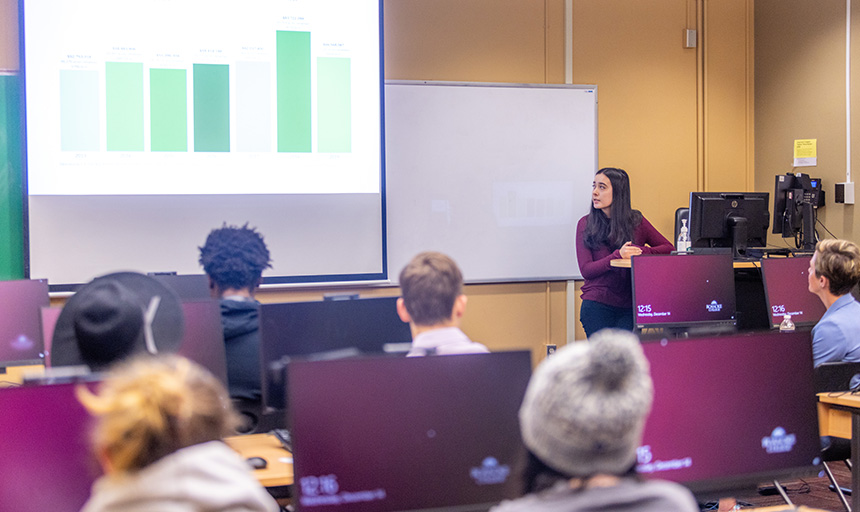
What came first, an NFL team’s winning record or its big-dollar budget? Is the true crime craze rewiring how society views tragedies? Can boarding a plane be made just a little dang easier, please?
These were just some of the questions explored by student researchers in this semester’s ECON Lab, an initiative of Roanoke College’s Center for Economic Freedom.
The program, helmed by center director and professor Alice Kassens, was started at the height of the pandemic to help students preserve a sense of community and continue honing their analytical skills amid the challenges of the abrupt shift to remote learning.
The setting is intentionally designed to be low-pressure. No course credits or grades hinge on the work. Instead, students of all majors are invited to participate as an outside project and pursue off-the-beaten-path topics that interest them.
“It’s about exploring and building a passion for research,” said Kassens, the John S. Shannon Professor of Economics. “It’s collaborative. Everyone comes together when we meet to set strategies and goals. We share what we found and give each other feedback. We help each other.”
She added that she plans to keep the program going in the post-pandemic era. “I want students to learn a joy for research,” she said. “Selfishly, it’s also been really rewarding for me. I’m so proud of the work these folks have done. I mean, just look at these projects.”
This semester’s students presented their findings to classmates and faculty in a Dec. 14 event dubbed a mini-conference — not because their ideas are mini, organizers noted, but because they were challenged to condense their work into concise, five-minute presentations.
Ethan Stevenson ’24, who’s done three research projects with ECON Lab, spurred chuckles when he announced his presentation’s title: “Skywalker vs. Kenobi: Using Statistics to Play Catan.”
The economics and political science double major explored whether cold, hard statistics could beat out human intuition in a game where both strategy and luck determine the victor. He played multiple online rounds of the world-building game Catan — using account names inspired by a galaxy far, far away — to determine if making moves based purely on the statistical odds would result in more wins than relying on his own judgment. His project included running statistical analyses to determine the biggest factors in achieving a win and creating a luck estimator to determine how the roll of the game’s dice affected his results.
His findings in the battle of man versus math? It was a tie. Both approaches resulted in the same ratio of victories.
“This was a fun chance to design my own experiment,” Stevenson said after his presentation. “There were times when it was frustrating, because in some games I could see another move would have worked so much better even though its statistical odds were slightly worse. But it forced me to apply different perspectives to the game.”

Ethan Stevenson ’24 presents his statistical experiment, “Skywalker vs. Kenobi: Using Statistics to Play Catan,” during the Dec. 14 ECON Lab mini-conference.
Stevenson, whose past projects included assessments of COVID-19 vaccine makers, said taking part in ECON Lab has broadened his understanding of real-world economics and statistics.
“I’ve learned that economics are really a part of everything and how it can be applied to things beyond our classes,” he said.
He added that the program also sharpened his presentation skills because limiting the talk to five minutes forced him to set priorities and focus only on what’s essential. ECON Lab alumni have reported back to the school that the experience made them stronger in job interviews as they knew how to express their ideas in a clear, efficient way.
Students in ECON Lab also face questioning from their classmates and professors during their mini-conference. Raquel Dominguez ’26, who was presenting for the first time, was asked to expand on her report, “The Effect of Hunting on Conservation: The Duck Stamp.”
Dominguez, who’s been interested in conservation connections since high school, examined the link between a commemorative duck stamp sold to support wildlife initiatives and actual, on-the-ground conservation work. Her research found that 98 cents of every dollar raised by the stamp was invested back into conservation and supported the rehabilitation of tens of thousands of acres of wetlands and waterfowl habitats each year.
Adjunct Lecturer Ray Leven, who owns the conservation-related Grouse Stamp, asked how revenue from the stamp itself stacked up against revenue from the sale of art prints also offered of the stamp designs. Dominguez said that type of more granular data was hard to come by. She had been hunting to find the reports that she did collect as the program is a little-studied subject.
“Not too many people know about these stamps,” Leven agreed, impressed that Dominguez had dug into it. “That’s good, thank you for your presentation.”
Dominguez said afterward that ECON Lab had helped her grow more comfortable with combing through data and with public speaking.
“It was a great experience, for sure,” she said. “I liked that so many people were interested in my research and that so many faculty showed up to hear our reports.”
She joined the program this semester after Kassens encouraged her to consider it.
“I’m a freshman, but she reached out to me and has been amazing,” Dominguez said. “She’s a great person to talk with. She wants to have conversations with you. She loves when people love economics, and she wants to help them.”
Other students who took part in ECON Lab this semester include:
- Katherine Vaughan ’24: “Does Boarding a Plane Faster Really Make a Difference?”
- Peter Simani ’26: “Negative Externalities of the True Crime Genre”
- Will Marston ’23: “Collective Craze”
- Nick Young ’25: “NFL Teams’ Value vs. Average Win Percentage”
ECON Lab: 2022 Mini-Conference
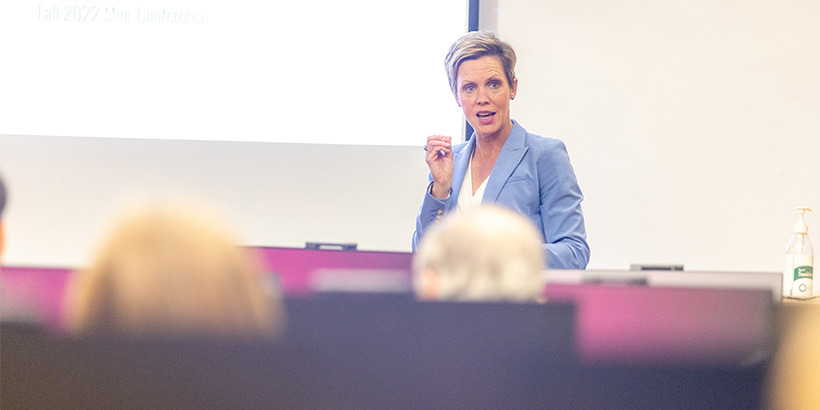
Alice Kassens, director of the Center for Economic Freedom and John S. Shannon Professor of Economics, addresses attendees at the Dec. 14 mini-conference of ECON Lab.
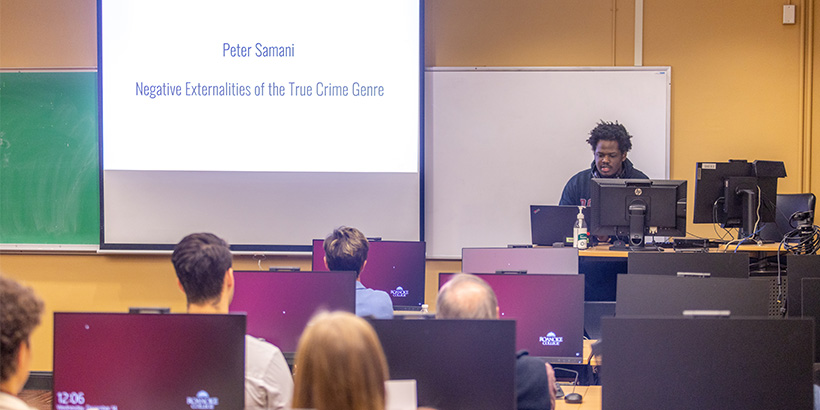
Peter Simani ’26 presents his report, “Negative Externalities of the True Crime Genre,” during the Dec. 14 ECON Lab mini-conference.
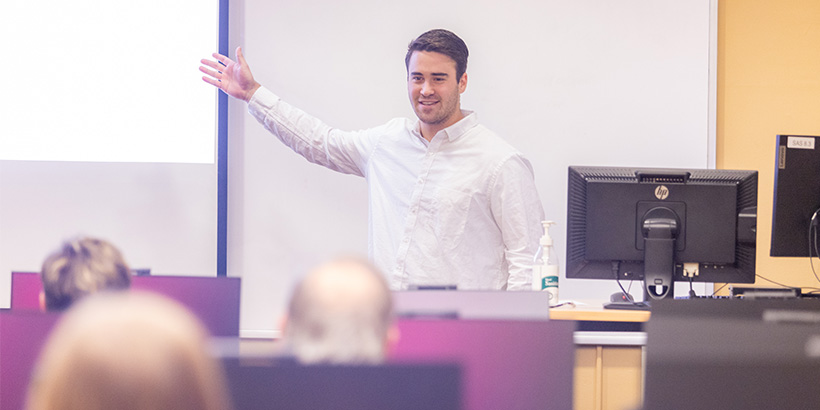
Will Marston ’23, who delivered the research presentation “Collective Craze," speaks during the Dec. 14 ECON Lab mini-conference.
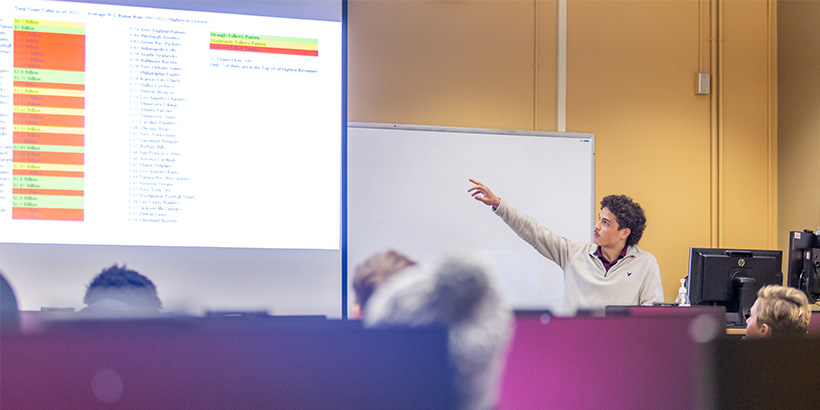
Nick Young ’25 highlights his research findings while presenting “NFL Teams’ Value vs. Average Win Percentage” during the Dec. 14 ECON Lab mini-conference.